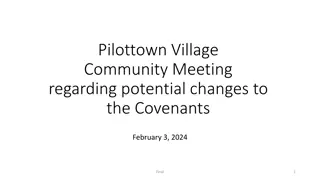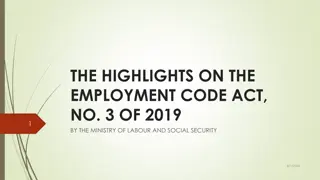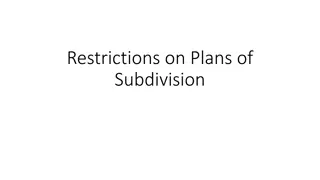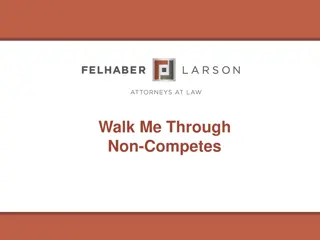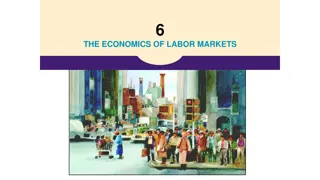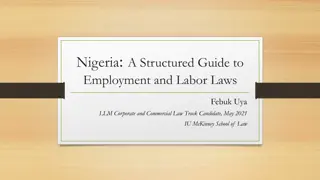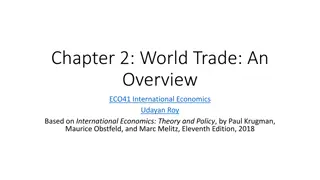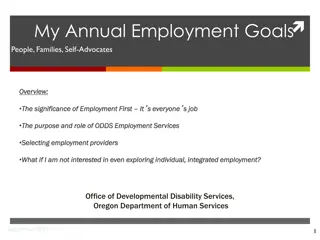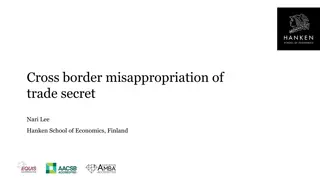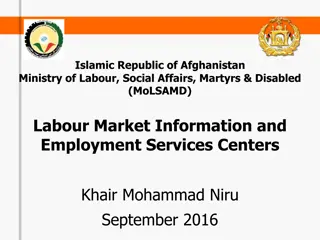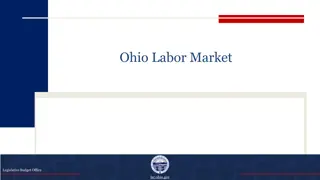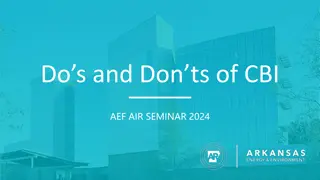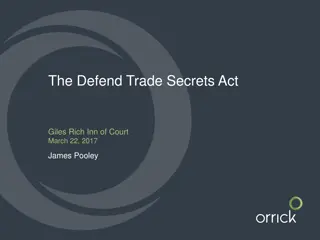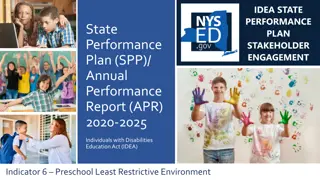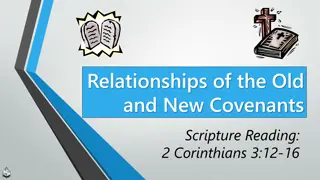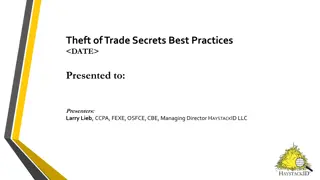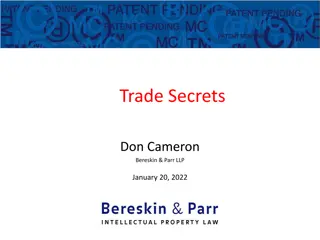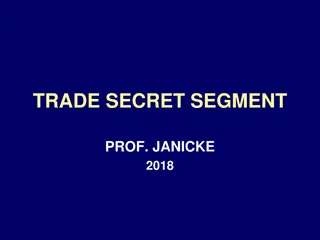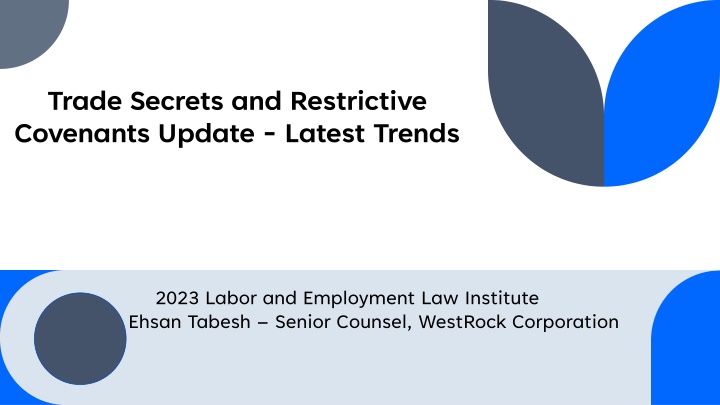
Latest Trends in Trade Secrets and Restrictive Covenants 2023 Labor & Employment Law
Stay updated on the latest trends in trade secrets and restrictive covenants with insights from the 2023 Labor & Employment Law Institute. Learn about the scrutiny surrounding confidentiality and non-disparagement clauses, as well as the implications of recent NLRB memos. Discover key takeaways for employers and legal considerations in light of these developments.
Uploaded on | 2 Views
Download Presentation

Please find below an Image/Link to download the presentation.
The content on the website is provided AS IS for your information and personal use only. It may not be sold, licensed, or shared on other websites without obtaining consent from the author. If you encounter any issues during the download, it is possible that the publisher has removed the file from their server.
You are allowed to download the files provided on this website for personal or commercial use, subject to the condition that they are used lawfully. All files are the property of their respective owners.
The content on the website is provided AS IS for your information and personal use only. It may not be sold, licensed, or shared on other websites without obtaining consent from the author.
E N D
Presentation Transcript
Trade Secrets and Restrictive Covenants Update - Latest Trends 2023 Labor and Employment Law Institute Ehsan Tabesh Senior Counsel, WestRock Corporation
Confidentiality and Non-Disparagement Clauses Under Scrutiny McLaren Macomb, 372 NLRB No. 58 (February 21, 2023) Broad confidentiality and non-disparagement clauses violate NLRA. Clauses at issue: Merely offering to provisions to non-supervisory employee is unfair labor practice. Confidentiality Agreement. The Employee acknowledges that the terms of this Agreement are confidential and agrees not to disclose them to any third person, other than spouses, or as necessary to professional advisors for purposes of obtaining legal counsel or tax advice, or unless legally compelled to do so by a court or administrative agency of competent jurisdiction. Confidentiality provision chills Section 7 rights: conferring with NLRB, coworkers, the union, and coworkers about terms and conditions of severance agreement. Non-disparagement clause has no temporal limit and not limited to prior employment matters. New standard: Do provisions have a reasonable tendency to interfere with, restrict, or coerce Section 7 rights? Non-Disclosure. At all times hereafter, the Employee agrees not to make statements to Employer's employees or to the general public which could disparage or harm the image of Employer, its parent and affiliated entities and their officers, directors, employees, agents and representatives. No required showing of animus, other unlawful practices, or actual coercion. 3/16/2025 2
Confidentiality and Non-Disparagement Clauses Under Scrutiny Take-aways: Decision arguably applies to unionized and non-unionized employees (but not to supervisory-level roles). Review severance agreements and narrowly tailor clauses Include comprehensive carve-outs protecting Section 7 rights and severability language. Review other employment agreement, offer letters, etc. 3/16/2025 3
NLRBs March 22, 2023 General Counsel Memo (re: McLaren) Directs regional offices to broadly interpret and enforce decision. Narrowly tailored clauses are permissible: Limited to prohibiting disclosure of confidential information. Only prohibit disclosure of financial terms of settlement to anyone but family and advisors. Non-disparagement limited to prohibiting conduct that meets definition of defamation. Reiterates that merely offering violative agreement infringes on NLRA. McLaren has retroactive application. Savings clauses may help resolve ambiguity but may not cure. Unexpected reference to non-compete and non-solicit provisions that could violate NLRA. 3/16/2025 4
May 30, 2023 NLRBs Office of GC Memo re: Non-Compete Agreements That Violate the NLRA Unfair labor practice to offer, maintain, or enforce overbroad non-compete. Lawful if narrowly tailored to address special circumstances justifying infringement on employee rights . If non-compete only prohibits: Ownership interest in competing business Misappropriation of trade secrets or confidential information. Higher standard when agreement imposed on low or middle-wage workers. Unclear whether non-solicits are covered. But Memo suggests NLRB may scrutinize overbroad non-solicits, as well. Field investigators should refer violative provisions for prosecution.
FTCs Proposed Rule on Non-Competes Unfair method of competition to enter into overbroad non-competes or even to represent that worker is subject to one. Applies to: All employees, contractors, and interns. Any contractual provision that is a de facto non-compete, like overbroad non-disclosure agreements. Requires rescission of invalid non-competes within 6 months of Rule s publication and individualized communication to impacted individuals. Narrow sale-of-business exception. Over 27,000 public comments received, delaying vote until April 2024. 3/16/2025 6
Likely Legal Challenge to FTC Proposed Rule Former FTC Commissioner Phillips (2020) FTC has never issued competition rule that generally bars unfair methods of competition. Proposed Rule arguably at odds with recent Supreme Court precedent Administrative agencies are creatures of statute . Only possess the authority that Congress expressly provides. NFIB v. OSHA, 142 S.Ct. 661 (2022) Major Questions Doctrine West Virginia v. EPA, 142 S.Ct. 2587 (2022) 3/16/2025 7
States Continue to Prohibit or Limit Non-Competes Minnesota Bill SF 3035: Bars non-competes except in limited circumstances (narrow sale of business). Effective July 1, 2023. Merely requiring one to sign non-compete violates the law. Applies to anyone who resides or works in Minnesota. Bars out-of-state choice of law and venue provisions. Excludes non-solicits and non-disclosure agreements. Allows injunctive relief, recovery of fees, and other remedies. New York: State Assembly passed A1278B. On Governor Hochul s desk for signature. Voids non-competes with employees or contractors. Excludes non-solicits. Mandatory liquidated damages, fees, and costs. 3/16/2025 8
Fifth Circuit Clarifies Irreparable Harm Standard Direct Biologics LLC v. McQueen, 63 F.4th 1015 (5th Cir. 2023) Direct Biologics alleged that former executive breached non-compete and misappropriated trade secrets. Trial court grants TRO but denies preliminary injunction. Declined to hold that irrefutablepresumption of irreparable harm arises merely from proof that highly trained employee breached non-compete. Fifth Circuit reverses in part. Trial court failed to assess whether disclosure of confidential information likely to occur, as opposed to had already occurred. DTSA and TUTSA permit injunction for actual or threatened injunction . Short shrift given to fact that McQueen possessed trade secrets, which he likely could use. Fifth Circuit agrees with trial court: No presumption of irreparable harm merely because McQueen was highlytrained employee in breach of non-compete. Instead, focused on defendant s post-employment possession of trade secrets.
Fifth Circuit Clarifies Irreparable Harm Standard Direct Biologics LLC v. McQueen, 63 F.4th 1015 (5th Cir. 2023) Plaintiffs seldom have direct proof of trade secret use at the outset. More common to only have evidence of possession. McQueen says plaintiffs can continue to rely on case-law that possession of trade secrets may create threat of immediate irreparable harm. DTSA and TUTSA permit injunction for threatened misappropriation . But McQueen also says that plaintiffs cannot solely rely on a presumption that an injunction will issue merely because a high-level employee works for a competitor. Must also proffer evidence that former employee is actually competing and the resulting incalculable harm.
Trade Secret Theft Pleading Standard UOP LLC v. Exterran Energy, 2021 WL 8016712 (S.D.Tex. 2021) Growing consensus that plaintiffs must identify TS with reasonable particularity. Bureau Veritas v. Cotecna, 2022 WL 912781 (S.D.Tex. 2022) Complaint identified trade secrets through broad categories: profit and loss information, financial information, business plans, and marketing strategies. Must plead or provide list that separately breaks out and describes alleged trade secrets. Cotecna moves to dismiss for failure to identify with sufficient particularity . Defendant must be able to understand how each claimed trade secret differs from publicly available information. Court denies 12(b)(6) motion. Bureau not required to disclose full details in public complaint. Details can be further developed with additional discovery. 3/16/2025 11
Other Jurisdictions Address Pleading and Proof Standard Mallet & Co. Inc. v. Lacayo, 16 F.4th 364 (3d Cir. 2021) Pleading thirteen broad categories of protected information insufficient. Must identify the specific characteristics of formulas or other trade secrets that provide competitive advantage. Must distinguish from publicly available information. Masimo Corp. v. True Wearables, 2022 WL 17083396 (C.D. Cal. Nov. 7, 2022) After bench trial, court found it would be inequitable to award fees because plaintiff failed to narrowly define trade secrets at outset, causing considerable expense. Plaintiff drove the trajectory of this case in a manner that required both partis to spend a significant amount of attorney s fees, as they prepared for trial. . . .Over three years . . ., Plaintiffs had whittled their intellectual property case down to a handful of trade secrets and a single patent claim. REXA, Inc. v. Chester, 42 F.4th 652 (7th Cir. 2022) A high level of specificity required. When complex or detailed descriptions of methods and processes presented, must isolate aspects that are unknown to the trade . 3/16/2025 12
Not Enough to Label Documents as Confidential Teligistics Inc. v. Advanced Personal Computing, No. 2019-15000 (190th Court of Harris County). Teligistics filed $23M sued against rival and company executives, asserting misappropriation claims concerning its online platform for handling contracts. Teligistics claimed that a copy of its RFP was stolen to modify competitor s RFP process. The proposal was marked as confidential . Defense claimed that while source code of Teligistic s bid platform could be a trade secret, its output (the RFP) was not. Defense verdict issued. Jury found Teligistics acted in bad faith, opening door to attorney s fees. See Sec. 134A. 005 (fees available to defense for bad faith claim of misappropriation). 3/16/2025 PRESENTATION TITLE 13
Thank you Ehsan Tabesh Ehsan.Tabesh@westrock.com

